The field of endocrinology is vast. Endocrine News talked to a cross section of Endocrine Society members and asked them, “What made you choose endocrinology?” From Society past-presidents, to veteran physicians, to young researchers just starting their careers, find out why your colleagues chose to go down the same path you did.
In the June issue of Endocrine News, our cover story was “The State of Endocrinology.” The overarching theme was that, yes, there are challenges to practicing this specialty, but those challenges pale in comparison to the rewards. Most of the time.
As was cited in that article, a 2013 Medscape survey showed that 27% of U.S. endocrinologists make between $200,000 and $250,000 a year, while 17% make $100,000 or less. However, down the hall in the cardiology wing, the average cardiologist makes $357,000, with 23% making $500,000 or more. Since the typical medical school graduate gets a debt load of about $174,500 along with his or her diploma, according to numbers from the Association of American Medical Colleges, obviously endocrinology is not the choice if you are “in it for the money.”
However, it is the obvious choice to a lot of practicing endocrinologists because progress in treating the human condition has been made year after year. In the research arena, new breakthroughs have been plentiful. Endocrine Society past-president Robert Vigersky, MD, director of the Diabetes Institute at the Walter Reed National Military Medical Center and professor of medicine at the Uniformed Services University of Health Sciences, Bethesda, Md., cites this progress as one reason why many enter the field in the first place.
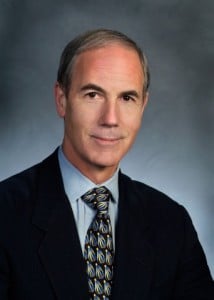
“The research advances that have occurred over the last two decades have extended endocrinology from a discipline that attempts to understand the physiology and pathophysiology of ‘internal secretions’ on all body systems to one that also seeks knowledge of the effect of cellular communications, genetics and gene expression, and receptorligand interactions on organ systems,” Vigersky says. “There are many examples of how the discoveries in these areas have directly improved patient diagnosis and treatment.” He is also one of the coauthors of the Society’s recent workforce analysis, Endocrine Clinical Workforce: Supply and Demand Projections, which was detailed in the January cover story, “Is There an Endocrinologist in the House?”
“I chose endocrinology because it was and still is the medical specialty that presents ultimate challenge in putting an understanding of biochemistry, cell biology, and genetics directly into patient care.” — Robert Vigersky, MD, director, Diabetes Institute at the Walter Reed National Military Medical Center; professor of medicine, Uniformed Services University of Health Sciences, Bethesda, Md.
In 2012, Medscape asked physicians the question “If you had to do it all over again, would you?” In 2011, almost 70% of endocrinologists would still choose a career in medicine, but that number fell to 57% in 2012. Moreover, only 38% of endocrinologists would choose endocrinology again, a discernable decline from 70% in 2011. Sadly, it appears that some in the field — physicians anyway — are suffering from “buyer’s remorse” in regards to their chosen discipline.
So taking all these issues into account, we decided to ask endocrinologists from around the world and from all three constituencies of the Endocrine Society membership — physicians in practice, clinical researchers, and basic scientists — a simple question: “Why did you choose endocrinology?” Their answers are thoughtful, enlightening, revealing, and even heartwarming.
Changes in Aptitudes
For the record, Vigersky says his chosen field was easy because he loves challenges. “I chose endocrinology because it was and still is the medical specialty that presents the ultimate challenge in putting an understanding of biochemistry, cell biology, and genetics directly into patient care.”
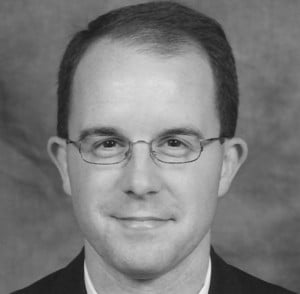
Similarly, Todd Frieze, MD, an endocrinologist with a practice in Biloxi, Miss., always considered himself a “thinker” in terms of doing puzzles, games, crosswords, etc. Therefore, he always had a penchant for in-depth analytical approaches to many parts of his life. “As I transitioned from medical school through residency, I found the thinking process for endocrinology to match this interest,” Frieze explains. “Since I have been in practice, I have found that the field of endocrinology places us as ‘medical detectives’ — taking the time to dig through records, arranging diagnostic testing via labs, imaging studies, dynamic endocrine testing. Thus, the practice of endocrinology distinctly matched my own personality.”
Glenn Matfin, MD, the editor of the Society’s first book published by Endocrine Press, Endocrine and Metabolic Medical Emergencies, says that the old adage “The pen is mightier than the sword” resonated with him when he was contemplating what direction to take early in his training. Should he choose the pen (i.e., prescribing) or the sword (i.e., scalpel)? “During the latter stages of my general (internal) medicine training, my career preference was further skewed toward more cognitive, nonprocedural specialties after doing a series of clinical rotations including rheumatology, neurology, and finally endocrinology.”
Under the Influence: Mentors, Professors, and ENDO
In a tale that is likely familiar to many endocrinologists, Matfin’s decision was further shaped by others. His endocrinology rotation working for the late Donald Munro, chair of medicine at the University of Sheffeld, UK, was especially influential because it allowed Matfin to focus on endocrinology as his ideal career pathway. This position further enabled him to obtain a clinical fellowship with one of Munro’s former mentees — Pat Kendall-Taylor and her colleagues at the University of Newcastle, UK. “Apart from exposing me to a much broader range of secondary and tertiary endocrinology care — all embedded in an enriched and nurturing basic and clinical research environment — it also, for the first time, gave me a unique insight into diabetes and its management,” Matfin says, adding that additional training in London at the Royal Free and St. Bart’s was followed by an opportunity as NIH visiting-fellow studying diabetes in the Pima American Indians in Arizona.
“Endocrinology has always struck me as the queen of the cognitive specialties: a discipline that provides continuing intellectual stimulation, pragmatic satisfaction, and great promise of discovery.” — Sam Dagogo-Jack, MD, A.C. Mullins Professor in Translational Research, director, Division of Endocrinology, Diabetes & Metabolism; director, General Clinical Research Center, University of Tennessee Health Science Center, Memphis, Tenn.
Sam Dagogo-Jack, MD, the A.C. Mullins Professor in Translational Research, director of the Division of Endocrinology, Diabetes & Metabolism, and director of the General Clinical Research Center at the University of Tennessee Health Science Center in Memphis, not only shares a similar motivation to Matfin, the two also share a mentor: Kendall-Taylor. While at the University of Newcastle during his residency training in internal medicine, he found himself with a bench space at the Wellcome Research Labs where he was a part of Kendall-Taylor’s group and was allowed to pursue clinical and bench training in endocrinology simultaneously. “With additional training as a metabolism fellow at Washington University School of Medicine, my fate was sealed and my commitment to endocrinology became irreversible,” he says.
Frieze can also point to a specific professor who had a profound impact on him while he was in the midst of his education at Emory University School of Medicine. “In the course of training, I believe that many of us have had a specific mentor that has guided us or directed us in a career choice,” he explains. “For me, that person was Guillermo Umpierrez. During the second year of medical school in a pathophysiology course, Dr. Umpierrez presented quite a few of the lectures during the endocrine section. These lectures sparked my initial interest in endocrinology as I saw the flow diagrams and feedback pathways. In the fourth year of medical school, I was able to spend one of my elective months with Dr. Umpierrez, which further sparked my interest in pursuing endocrinology. His dynamic teaching style and interesting lectures really shined light on the positive aspects of endocrinology.”
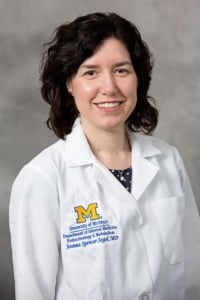
From the influence of a single mentor or professor during training to the influence of several, Joanna Spencer-Segal, MD, PhD, chose endocrinology after attending ENDO 2008. She was still a graduate student studying neuroendocrinology and was preparing to return to Weill Medical College of Cornell University to finish a combined MD/PhD program. However, she was conflicted by the many competing interests that can affect a trainee’s choice of scientific or medical specialty. Then came a fateful trip to San Francisco for ENDO 2008.
“I found that the meeting combined clinical and basic science very successfully, and felt this reflected a positive environment for physician-scientists in endocrinology,” she explains. “As a neuroscientist, I like that endocrinologists must consider the integration of all of the body’s systems including the brain, with hormones as messengers. To me this was preferable to a subspecialty focused on just one organ system.” Spencer-Segal is currently a second-year endocrine fellow at the University of Michigan where she is participating in a combined residency and fellowship training that follows the American Board of Medicine’s research pathway.
Excited About Endocrinology
According Bulent O. Yildiz, MD, professor of medicine and endocrinology at Hacettepe University School of Medicine in Ankara, Turkey, the word “hormone” means “excite” in ancient Greek and that was his reaction to endocrinology after undergoing various internal medicine subspecialties during his residency. “Endocrinology got me excited in those days and I was drawn to it,” he says. “I ended up training in a rigorous program, and being an endocrinologist in academic medicine has been a truly rewarding career ever since.”
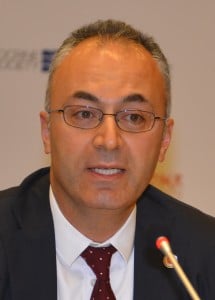
Yildiz says he was impressed how endocrinology is not an “organ specialty” and is unique since hormones control the entire body with effects on homeostasis, growth, development, metabolism, and reproduction. “As an endocrinologist, you are exposed to a huge variety of endocrine problems, some of which are not localized to a particular organ and present with subtle clinical features; some being common with huge impact both at individual and community levels; and some being quite rare with interesting presentations,” he says. “Sound clinical judgment for every patient walking through the door requires a broader perspective and knowledge.”
Performing dynamic endocrine tests and interpreting their results provide excellent integration of physiology, biochemistry, and clinical medicine, Yildiz continues, adding that overall, intellectual stimulation for diagnosis and management in endocrinology is just fascinating. “For me,” he says, “this is the most appealing feature of endocrinology.”
Nikolaos Nikolaou, a doctoral student at the Oxford Centre for Diabetes, Endocrinology & Metabolism, Churchill Hospital, University of Oxford, Headington, UK, shares Yildiz’s enthusiasm and excitement for the field. He realized that when he was contemplating which system to study, the endocrine system was one of the most exciting. “Its complexity as well as its contribution to many crucial steps of growth, development, and physiology forced me to focus on how hormones act, affect, and modulate body function,” he says. “That was the reason I chose a masters in science based on female reproduction and examined the impact of androgens on lipid metabolism for my thesis.”
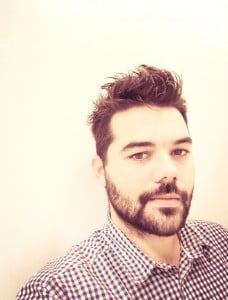
Nikolaou explains that over time he decided to specialize on sex hormones and diabetes and is thoroughly excited by how challenging and rewarding the field has proven to be. “It is an area where both basic science and clinical medicine run in parallel, and, as a basic scientist, I get thrilled by how my research can have such a great impact on patients’ quality of life,” he says. “The daily interaction with clinicians and patients as well as with people from similar, but not the same, endocrine field gives you a unique opportunity to broaden your knowledge and helps to better understand how other key endocrine tissues can also contribute to the metabolic disease.”
Nikolaou adds that due to the global escalation of metabolic disease, which has been shown to reduce life expectancy by more than 10 years in some cases, endocrinology research has become even more crucial than ever. “This is what makes you feel like your work is really worthwhile,” he adds.
This Time It Really Is Personal
Other times, the choice of a career can be extremely personal as it was for Syed Sufyan Hussain, PhD, Darzi Fellow in Clinical Leadership, Specialist Registrar, and honorary clinical lecturer in Diabetes, Endocrinology, and Metabolism at the Imperial College Healthcare NHS Trust and Imperial College, London, UK, who wanted to be a lawyer until he was 11. The turning point for him came when he was diagnosed with type 1 diabetes.
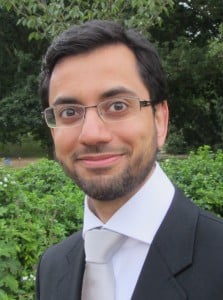
“The experience of going through the diagnosis, treatment, and day-to-day life with a condition that requires careful replacement of a hormone, necessary not just for optimum health but for survival, was a real eye-opener to the world and power of hormones,” he says. “Understanding why they go wrong, replacing them, blocking them, or even harnessing their potential for a different disease fascinated me. It’s this attraction that led me to work in this specialty with the hope of benefitting others by understanding hormones better.”
Like many of his colleagues, Hussain stresses the uniqueness of endocrinology and how unlike some other specialties, clinical endocrinology is a multi-systemic specialty and affects a range of different organs, which keeps things interesting. “This lends itself really nicely to teaching and medical education too,” he says. “Moreover, endocrine conditions tend to be chronic diseases. As endocrinologists we are very privileged to have long-term relationships in supporting our patients holistically through the various stages in their life journey — something I found immensely rewarding and allowed me to use my own life experiences as a patient in helping others.”
“As endocrinologists we are very privileged to have long-term relationships in supporting our patients holistically through the various stages in their life journey – something I found immensely rewarding and allowed me to use my own life experiences as a patient in helping others.” — Syed Sufyan Hussain, PhD, Darzi Fellow in Clinical Leadership, Specialist Registrar, honorary clinical lecturer in Diabetes, Endocrinology and Metabolism, Imperial College Healthcare NHS Trust, Imperial College, London, UK
…And That’s Why I Chose Endocrinology
Matfin, a consulting physician with the UK’s National Health Service, says that he has never been disappointed with his career choice of endocrinology and diabetes. “The intellectual process of combining focused history, targeted physical exam, and diverse investigations culminating in correct diagnosis and appropriate treatment and monitoring is very satisfying and a great benefit for the patient whose condition has often not been diagnosed or managed optimally,” he says. “A career in endocrinology and diabetes has also personally benefitted me in many ways including allowing me to travel and work internationally; meet and interact with basic and clinical thought-leaders; be engaged in experimental and translational research leading to novel diagnostic tools and therapies; and attempt to demystify and share endocrine and metabolic knowledge with undergraduates and clinicians alike. Last but not least, it is always a pleasure and privilege (no matter how fed-up we are feeling!) to care for persons (and families) with endocrine disorders. Endocrinology is an evolving and fast-moving field, and it never ceases to stimulate or surprise.”
“With hindsight, endocrinology has always struck me as the queen of the cognitive specialties: a discipline that provides continuing intellectual stimulation, pragmatic satisfaction, and great promise of discovery,” Dagogo-Jack explains. “The allure of endocrinology is the mastery of a much broader range of organs, glandular systems, and signaling pathways than is typical for the other subspecialties.”
“It is always a pleasure and privilege to care for persons with endocrine disorders. Endocrinology is an evolving and fast-moving field and it never ceases to stimulate or surprise.” — Glenn Matfin, MD, consulting physician, National Health Service, UK; editor, Endocrine and Metabolic Medical Emergencies
According to Hussain, endocrine disorders bring in a range of other issues including public health, preventative medicine, policy, health economics, healthcare systems, medical informatics, cultural issues, clinical leadership, patient self-management, and engagement. “To sum it all up, endocrinology is a fascinating and challenging multi-dimensional specialty that opens the doors to an array of stimulating opportunities packaged into a family-friendly environment. So why would I choose anything else?”
— Newman is the editor of Endocrine News. He wrote about online communities for young adults with endocrine disorders in the November issue.

